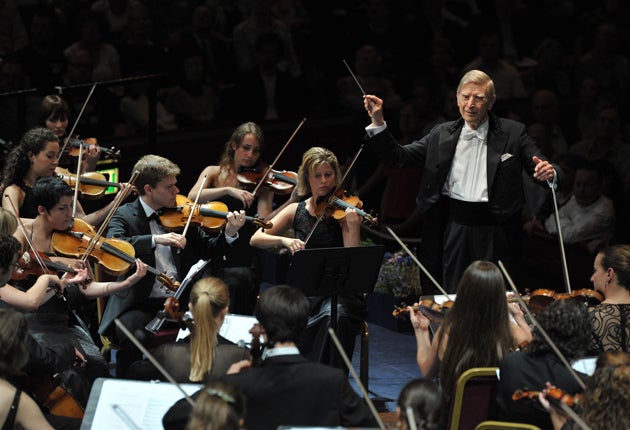Prom 62, Royal Albert Hall, London<br/>Prom 57, Royal Albert Hall, London<br/>Prom 61, Royal Albert Hall, London
What a powerful trio – music, silence and ear-splitting applause

When it came, the applause for Herbert Blomstedt and the Gustav Mahler Jugendorchester (Prom 62) was ear-splitting.
More telling was the reverential silence that preceded it. This was a concert of uncompromising seriousness, from Hindemith's intricate extrapolation of Grünewald's Isenheim Altarpiece, Symphony "Mathis der Maler", to the monumental stained-glass panels of Bruckner's Ninth Symphony. Framed by two triptychs of angels and demons, redemption and torment, one dizzyingly vertical, the other as broad as the horizon, Mahler's Lieder eines fahrenden Gesellen was almost light relief. Yet Christian Gerhaher's clean, contained singing gave this headily perfumed concentrate of bitter disillusionment, violent fantasy and mocking natural beauty an intimacy and directness of expression rarely achieved in orchestral song.
Having played Parsifal under Claudio Abbado, the Gustav Mahler Jugendorchester are no strangers to complex textures or large canvasses. With 12 double-basses arranged in a magnificent line along the back of the stage, behind and above the brass and percussion, the balance was secure and clear. The dancing counterpoint of Hindemith's Engelkonzert was delivered with minimal vibrato from the strings and bell-like notes from the brass. Flute, oboe and clarinet lamented sweetly through the Grablegung, while the lacerating, demonic trills, consoling cellos and Praetorian syncopations of Versuchung des Heiligen Antonius were perfectly balanced and contrasted.
Reduced to 70 players, the orchestra's Mahler was similarly vivid, the hushed pizzicato bass notes at the close of "Wenn mein Schatz Hochzeit macht" barely audible, Blomstedt's balancing and rebalancing of the textures of "Ging heut' morgen übers Feld" cinematographic in its lushness and dexterity. Chaste and cool but for the hot, guttural rasp of "Ach, was ist das für ein böser Gast!", Gerhaher's sound was almost that of a tenor, pure, unadorned, conversational. The first imprecatory movement of Bruckner's unresolved symphony had numinous heft, the roiling Scherzo was a nightmare of mechanistic brutality, its hedonistic Trio an image of rouge-and-petticoats temptation. In a work that is more easily admired than loved, the Adagio was a long exhalation of briney Wagner tubas and sour flutes, the grit and throb of the violin theme a shock after the tonal chastity of the preceding movements. Devoid of extraneous drama and flailing gesture, each movement closely linked to the next, Blomstedt's Bruckner had impeccable authority and clarity.
The Minnesota Orchestra is unique in North America in having addressed the issue of how to play Beethoven on modern instruments in a post-period-instruments age. While its cousins in New York, Los Angeles, Boston, Cleveland and elsewhere still cultivate a high-gloss, heroic, late Romantic sound, Minnesota has honed and trimmed its strings to Size 6 gym-bunny litheness. Backgrounded for much of Berg's Violin Concerto in the second of their Proms appearances, (Prom 57), they floated serenely over the orchid-house flutes and chill brass chorale as soloist Gil Shaham traced the delicate, dewy figures dedicated to the memory of Manon Gropius. In Osmo Vänskä's athletic sprint through Beethoven's Ninth Symphony, their attack was brilliantly unanimous and fearless, though there was precious little rubato and no space for the players – or the audience – to breathe and wonder. For much of the symphony, Vänskä appeared to be trying to manoeuvre a large dirigible through a very small aperture, which, in a way, he was.
Last weekend brought a head-cold of terrifying efficiency and merciful brevity. Fearing the death-ray glare of the cough-monitor who stands in the arena at the foot of the Door 3 stalls, turning programme fumblers and bag-rustlers to dust with a single glance, I kept my snuffles to myself and listened to Prom 61 at home. Radio isn't the medium for fat-suits, see-thru macs, pink wigs or false breasts, let alone gingerbread models of the Royal Albert Hall (a nice touch), but Glyndebourne Festival Opera's semi-staged performance of Hänsel und Gretel with the London Philharmonic Orchestra had wit and tenderness enough to restore the innocence that Laurent Pelly's arch 2008 staging sucked from Humperdinck's sugar-frosted score.
Making his Proms debut, Robin Ticciati started slightly stiffly in the Overture (again a lack of rubato), only warming up in the Hexenritt. In Act II the LPO excelled, their woodwind birdcalls just the right blend of naivety and artfulness, their strings and horns sweet and solemn in the Hymn. The same qualities could be heard in Lydia Teuscher's sprightly Gretel and Alice Coote's Hänsel – so ardent, rich and true, with something of the throaty, no-nonsense delivery of a continental boy treble. Somewhat colourless in the first Glyndebourne run, Wolfgang Ablinger-Sperrhacke's Witch has developed into a thrillingly uninhibited comic/horrific turn. William Dazeley and Irmgard Vilsmaier were the harried parents, Tara Erraught and Ida Falk Winland the Sandman and Dew Fairy. Blame it on over-the-counter cold medicine or late-onset sentimentality, but I loved it.
Next Week:
Anna Picard goes to hell and back with Harry Joy, the advertising executive hero of Brett Dean's Bliss
Subscribe to Independent Premium to bookmark this article
Want to bookmark your favourite articles and stories to read or reference later? Start your Independent Premium subscription today.

Join our commenting forum
Join thought-provoking conversations, follow other Independent readers and see their replies